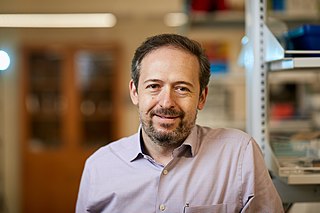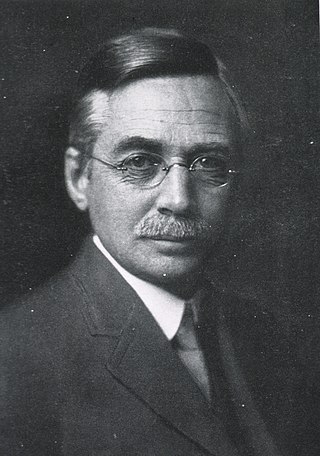Related Research Articles
Stanford University School of Medicine is the medical school of Stanford University and is located in Stanford, California. It traces its roots to the Medical Department of the University of the Pacific, founded in San Francisco in 1858. This medical institution, then called Cooper Medical College, was acquired by Stanford in 1908. The medical school moved to the Stanford campus near Palo Alto, California, in 1959.
The Sir William Dunn School of Pathology is a department within the University of Oxford. Its research programme includes the cellular and molecular biology of pathogens, the immune response, cancer and cardiovascular disease. It teaches undergraduate and graduate courses in the medical sciences.
Irving Lerner "Irv" Weissman is a Professor of Pathology and Developmental Biology at Stanford University where he is the Director of the Stanford Institute of Stem Cell Biology and Regenerative Medicine along with Michael Longaker.
Hugh O'Neill McDevitt ForMemRS was an immunologist and Professor of Microbiology and Immunology at Stanford University School of Medicine.
C. Garrison Fathman is a Professor of Medicine and Division Chief of Immunology and Rheumatology at Stanford University School of Medicine. He is also the Associate Director of the Institute for Immunity, Transplantation and Infection and Director of the Center for Clinical Immunology at Stanford University. He was Founder and first-President of the Federation of Clinical Immunology Societies. As Director of the CCIS, Dr. Fathman initiated a multidisciplinary approach to study and treat autoimmune diseases, including rheumatoid arthritis, multiple sclerosis, and insulin-dependent diabetes mellitus, and initiated several new approaches to education and community outreach.

Atul J. Butte is a biomedical informatics researcher and biotechnology entrepreneur. He is currently the Priscilla Chan and Mark Zuckerberg Distinguished Professor at the University of California, San Francisco. Since April 2015, Butte has serves as inaugural director of UCSF's Bakar Computational Health Sciences Institute.

James Patrick Allison is an American immunologist and Nobel laureate who holds the position of professor and chair of immunology and executive director of immunotherapy platform at the MD Anderson Cancer Center at the University of Texas.

Dame Fiona Magaret Powrie is currently the head of the Kennedy Institute of Rheumatology at the University of Oxford. Formerly she was the inaugural Sidney Truelove Professor of Gastroenterology at the University of Oxford. She is also head of the Experimental Medicine Division of the Nuffield Department of Clinical Medicine.

Max Dale Cooper, is an American immunologist and a professor at the Department of Pathology and Laboratory Medicine and the Emory Vaccine Center of Emory University School of Medicine. He is known for characterizing T cells and B cells.
Ephraim Engleman was an American rheumatologist and a Clinical Professor of Medicine at the University of California, San Francisco. He had a major national and international impact on rheumatology during more than six decades, and wrote more than one hundred scientific and medical papers.

Dr. Paul B. Rothman is the former Frances Watt Baker, M.D., and Lenox D. Baker Jr., M.D., Dean of the Medical Faculty, vice president for medicine at Johns Hopkins University, and former chief executive officer of Johns Hopkins Medicine. As dean and CEO, Dr. Rothman oversaw both the School of Medicine and the Johns Hopkins Health System, which together encompass six hospitals, hundreds of faculty and community physicians and a self-funded health plan.
Samuel Strober was a biomedical researcher and inventor best known for his work on the elimination of the need for lifelong immune suppressive drugs in organ transplant patients.
Jeffrey A. Bluestone is the A.W. and Mary Margaret Clausen Distinguished Professor Emeritus of Metabolism and Endocrinology at the University of California, San Francisco, and was, for a number of years, an earlier executive vice chancellor and provost of that university. He began the UCSF affiliation in 2000, after earlier extended positions at the NCI-NIH, and at The University of Chicago. Bluestone earned his undergraduate and masters degrees in microbiology from Rutgers State University, and his doctoral degree in immunology from Cornell Graduate School of Medical Science. His current research is focused on understanding T cell activation and immune tolerance in autoimmunity and organ transplantation. In April 2016, he co-founded and served as the president and CEO of the Parker Institute for Cancer Immunotherapy,. In 2019, he co-founded and is Chief Executive Officer and President of Sonoma Biotherapeutics.

Jonathan Kipnis is a neuroscientist, immunologist, and professor of pathology and immunology at the Washington University School of Medicine. His lab studies interactions between the immune system and nervous system. He is best known for his lab's discovery of meningeal lymphatic vessels in humans and mice, which has impacted research on neurodegenerative diseases such as Alzheimer's disease and multiple sclerosis, neuropsychiatric disorders, such as anxiety, and neurodevelopmental disorders such as autism and Rett syndrome.

Carl H. June is an American immunologist and oncologist. He is currently the Richard W. Vague Professor in Immunotherapy in the Department of Pathology and Laboratory Medicine at the Perelman School of Medicine of the University of Pennsylvania. He is most well known for his research on T cell therapies for the treatment of several forms of cancers. In 2020 he was elected to the American Philosophical Society.
Miram Merad is a French-Algerian professor in Cancer immunology and the Director of the Marc and Jennifer Lipschultz Precision Immunology Institute (PrIISM) at the Icahn School of Medicine at Mount Sinai (ISMMS) in New York, NY. She is the corecipient of the 2018 William B. Coley Award for Distinguished Research in Basic Immunology and a member of the United States National Academy of Sciences and the National Academy of Medicine.

Ludvig Hektoen was an American pathologist known for his work in the fields of pathology, microbiology and immunology. Hektoen was appointed to the National Academy of Sciences in 1918, and served as president of many professional societies, including the American Association of Immunologists in 1927 and the American Society for Microbiology in 1929. He was the founding editor of the Archives of Pathology and Laboratory Medicine in 1926 and edited several other medical journals. He was knighted to the Order of St. Olav in 1929, and in 1933, he became professor emeritus of pathology at the University of Chicago. The Hektoen Institute for Medical Research—formerly the John McCormick Institute of Infectious Diseases—now bears his name.

Mary L. "Nora" Disis is an American physician-oncologist and the editor in chief of JAMA Oncology.
Matthew F. Krummel(Max Krummel) is a Professor in the Pathology Department at University of California, San Francisco. He is known for Systems Immunology and studies mechanisms that regulate the immune system.
References
- 1 2 "Edgar Engleman". Stanford Medicine CAP Profiles. Retrieved 2023-04-18.
- ↑ "Fireside Chat:Entrepreneuership" (PDF). Taiwan Biomedical Innovation Association. November 19, 2022.
- 1 2 3 4 5 6 7 8 9 Engleman, Edgar G. "Curriculum Vitae". Stanford University School of Medicine. Retrieved 2023-04-16.
- 1 2 3 4 "Dr. Edgar Engleman: Advancing the Field of Cancer Immunology - NCI". www.cancer.gov. 2022-11-21. Retrieved 2023-04-16.
 This article incorporates text from this source, which is in the public domain .
This article incorporates text from this source, which is in the public domain . - ↑ "Engleman Lab". Engleman Lab. Retrieved 2023-04-18.
- ↑ "Dr. Edgar Engleman". Stanford Blood Center. Retrieved 2023-04-18.